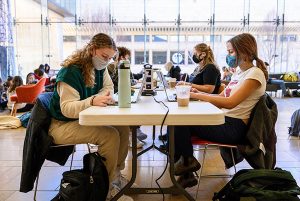
Parents and families play an important role in coaching their students through the rigorous academic aspects of college. But when students are feeling overwhelmed about finals week, it can be hard to know how to help. This year, finals begin on May 8 and end on May 13.
To help your students finish strong, experts from Student Affairs offer the following tips to pass along to your students to help them stay focused and healthy during a stressful time of the academic year.
Plan for success.
- Get organized. If you’ve fallen behind, take some time to reflect on your study habits and know that you can still get back on track. Do you have your exam dates written down? What does your finals schedule look like? Starting to think proactively will help ease your mindset going into exam time.
- Identify your goals for each exam. How have you been doing in your classes, and how well do you understand the material? Meet with your instructors during office hours to make sure you have what you need to prepare for the exam.
- Outline a schedule for yourself so you can break down your studying into smaller, more manageable increments.
- Be kind to yourself. You’ll be going through a lot in the next few weeks. Take some “me” time before finals and do something meaningful. Cross a few activities from your bucket list before the semester is over.
Get into study mode and find support.
- Now is a good time to gather some study partners and start reviewing course material together. Meeting with a group is a great motivational tool. You can all keep each other on track, and exchange notes and information.
- Make an oasis. After spending hours crouching over your laptop and textbooks, you’ll want a comfortable place to decompress.
- Try out an app for mindfulness and wellbeing, including the free Healthy Minds app developed by UW–Madison’s Center for Healthy Minds.
Take care of yourself and make time for breaks.
- Research has shown that taking a break from studying can help with energy and increase focus. Find time to pause and take a moment to relax and recharge. Take a walk outside, listen to music, drink water, sleep or reach out to your loved ones.
- Change your scene, and find a place that helps you feel relaxed. The Wisconsin Union’s Union South, Memorial Union and Memorial Union Terrace have so many spaces for you to study, dine and take a break. Explore the buildings to find the study spots you may not have discovered before or try out a new library.
- Self-Care Week at UW’s Recreation and Wellbeing takes place May 7–13. Enjoy free group fitness and meditation classes.
- The Wisconsin Union has free events to help you with that re-energizing break.
Remember you’re not alone.
- There are teams of people at UW–Madison who are here to support your basic needs, mental health, and academic success. If you’re not sure where to start, the Dean of Students Office can guide you. Their staff provides same day drop-in appointments and can help students talk through a situation, plan next steps, and locate resources.
- Mental Health Services, through University Health Services, offers individual, couple/partner, and group counseling, as well as stress management services. Their providers understand the complexities of student life and provide an open, safe, and confidential environment to help students through issues that may interfere with their development, well-being, and academic productivity.
- All undergraduate students have at least one assigned academic advisor. Advisors are professional staff or faculty who have been specifically trained to help you with your plans and goals during college and beyond. Advisors are here to introduce you to opportunities and help you make decisions. If you have questions or want support, if you are looking for a sounding board, or if you simply need someone to point you in the right direction, advisors are here for you.
- Academic support can include assistance in study skills, research, writing, and other tutoring support services.
- The Office of Student Financial Aid provides information on basic needs resources that are offered through UW–Madison and our local community. There are also Basic Needs Assistants available to help connect with you to navigate resources. You can connect directly with a Basic Needs Assistant by either emailing basic.needs@finaid.wisc.edu or completing this request form.
Confidence is key — you’ve earned it!
- When exam day approaches, the best thing you can do for yourself is to get a good night’s sleep. Those eight-plus hours of sleep will improve your memory and help your brain retain the material you’ve been poring over the past few weeks.
- Make sure you’re prepared with the basics: a pencil, calculator, or whatever else you may need for your exams. (Some exams may require you to show your student ID or write down your student ID number.)
- By now, you’ll be able to take that exam with confidence. Envision yourself acing it — and with all this preparation, you deserve to!